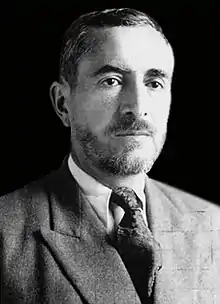Qazi Muhammad
Qazi Muhammad (Kurdish: قازی محەممەد / Qazî Mihemed, Persian: قاضی محمد; 1 May 1893 – 31 March 1947[1]) was a Kurdish religious and political leader who founded the Democratic Party of Iranian Kurdistan and headed the short-lived, Soviet-backed Republic of Mahabad. He was hanged by the Iranian government for treason in 1947.[2]
Qazi Muhammad | |
|---|---|
| قازی محەممەد Qazî Mihemed | |
 | |
| President of the Republic of Mahabad | |
| In office 22 January 1946 – 15 December 1946 | |
| Preceded by | Office created |
| Succeeded by | Office abolished |
| Personal details | |
| Born | 1 May 1893 Mahabad, Sublime State of Persia |
| Died | 31 March 1947 (aged 53)[1] Mahabad, Imperial State of Iran |
| Cause of death | Execution by hanging |
| Citizenship | Iranian |
| Nationality | Kurdish |
| Political party | PDKI |
| Children | 5 |
| Profession | Lawyer |
Biography
Qazi Muhammad was born into a noble Kurdish family from Mahabad.[3] His father had cooperated with Simko Shikak during his revolt against the Iranian government in the 1920s, and his brother Sadr Qazi was a member of the Iranian parliament.[4] After his father's death, he was nominated as a judge in Mahabad in the 1930s.[5] Qazi Muhammad later became a member of the Komala Zhian I Kurd, a leading Kurdish organization in Iran at the time supported by the Soviets, in April 1945.[6] Soon after he became its leader.[3] Muhammad acted as the President of the Republic of Mahabad, which was founded in January 1946, and declared publicly in March of the same year.[7] He was also the founder of the Kurdish Democratic Party of Iran, that was established after the need for a more transparent party was felt by its adherents. (Komeley Jiyanewey Kurd existed prior to that, as a secret organization.) Mustafa Barzani, one of the leaders of the nationalist Kurdish movement in Iraqi Kurdistan, was also the commander of its army. His cousin, Mohammed Hossein Saif Qazi, was a minister in his cabinet. In April 1946, with the support of the Soviets, Muhammad signed a peace treaty with Ja'far Pishevari of the Azerbaijani republic in which they exchanged assurances that the Azerbaijani and Kurdish minorities rights in each republic would be preserved.[8] A year later, after the Soviets withdrew from Iran, the socialist Kurdish Republic was removed by Iran's central government.
Family
One of his sons, Ali Qazi, is today an active member in the Kurdish movement. One of his daughters, Efat Ghazi, was killed by a letter bomb in Västerås, Sweden, in 1990.[9] The bomb was addressed to her husband, the Kurdish activist Emir Ghazi.[10] Some analysts speculated that the Iranian government might have been involved in the assassination.[11][12]
References
- McDowall, David (2004). A Modern History of the Kurds (3rd ed.). I.B.Tauris. p. 245. ISBN 9781850434160.
- Portal, Kurdistan (20 December 2008). "Das Vermächtnis des kurdischen Märtyrers Qazi Mohammed". Kurdmania (in German). Archived from the original on 27 July 2011. Retrieved 22 February 2009.
- Jwaideh, Wadie (19 June 2006). The Kurdish National Movement: Its Origins and Development. Syracuse University Press. p. 249. ISBN 978-0-8156-3093-7.
- Entessar, Nader (1992). Kurdish Ethnonationalism. Lynn Rienner Publishers. pp. 18–21. ISBN 978-1-55587-250-2.
- Jwaideh, Wadie (2006-06-19), p. 250
- Jwaideh, Wadie (2006), pp.247–248
- Jwaideh, Wadie (2006), p. 252
- Entessar, Nader (1992). Kurdish Ethnonationalism. Lynn Rienner Publishers. p. 21. ISBN 978-1-55587-250-2.
- Fälth, Gun (7 September 1990). "Kvinna sprängd till döds" (in Swedish). Dagens Nyheter.
- Westmar, Bo (7 September 1990). "Bomben var avsedd för maken" (in Swedish). Dagens Nyheter.
- Rahimi, Babak (19 November 2002). "Offer för Irans dödspatruller" (in Swedish). Mana. Retrieved 30 December 2007.
- Darvishpour, Mehrdad (30 September 2003). "Säpo skyddar Irans flyktingspioner". Svenska Dagbladet (in Swedish). Retrieved 30 December 2007.